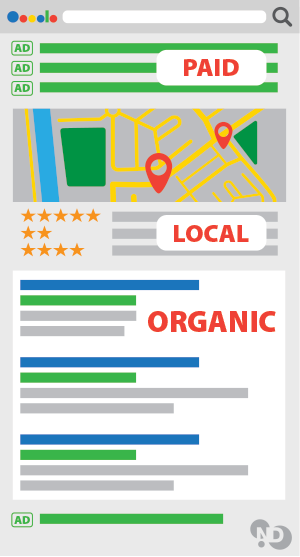I get this question a lot. SEO can refer to some simple basics of search engine optimization on your website, but it can also be a lot more complex than this. Just in 2018 alone, Google is reported to have made 3,234 updates to its search algorithm. Although many of these changes are minor, there are some major ones that when rolled out, can really affect your rankings in a big way.
No matter what kind of business you are running, you are going to want to have visitors to your website. Without traffic, your reputation won’t grow, and your brand won’t be recognizable. Although the importance of SEO is always being questioned, it is still one of the most pivotal steps toward establishing your business and brand.
What is SEO?
Search engine optimization, or SEO, refers to the practice of gaining more quality and quantity on your website to increase traffic, conversions and ultimately, brand exposure.
Despite this definition, SEO is more about people than the algorithms that make it possible. By leveraging certain SEO practices such as keywords, long-tail search phrases, fresh relevant content and back links — you can increase the usability and user experience on your site. This results in making people favour your brand more, and thus helping you to connect to even more people.
 What are organic searches?
What are organic searches?
SEO works in your favour by increasing the relevance of your site when someone searches for something within your niche. Whenever your site pops up on the search engine results pages (SERPs) naturally, it is considered an organic search. In other words, your site appears based on factors like relevance, content, tags and descriptions rather than paid advertising and promoted positions on the SERPs.
For example, if you were to search for “Ottawa graphic designer,” you would see several results at the top of the page with a little “Ad” sign near the description. You will then likely see the local search which is a combination of paid and organic results. Below that with blue links are content listings that match to your query and appear based on Google’s algorithm. These are solely organic results. At the bottom there is another section of paid ads.
Why does SEO matter?
So, if you can just buy a spot on the result page, what is the point of SEO? Well, simply, SEO gives you more than 20 times the traffic opportunity than pay-per-click (PPC) advertising for both mobile and desktop platforms. Why?
The main reason is: People don’t click on paid advertisements as much as they click on organic search results.
That organic section on the first page or two is where you ideally want to be. SEO is one of the only kinds of online marketing that continues to serve you over time. As long as you keep up with the practice using up to date methods, you will keep ranking. You will maintain your popularity and reputation, and get more visitors every single day.
What are the key benefits of SEO?
Any business in any industry should be making use of SEO for more relevance and visibility on the internet. Here is a quick look at the primary benefits of using SEO for your business:
- Increased traffic – the higher your website is on the SERPs for a particular keyword, the more clicks you get. Statistically, the first place on Google has an average click through rate of 27.5%, meaning that for every 100 times your website appears in the SERPs, you get 27-28 visitors.
- More visibility – the better your ranking, the more people will see your brand name. Since it takes about 5-7 impressions for someone to remember your brand, you want to get seen as often as possible.
- More trust and credibility – higher ranked websites as seen as more trustworthy and reliable.
- Better branding – a consistently ranked website means enhanced marketing and faster reputation gains.
- Cost-effective investment – SEO is a process — but it is one that sets a solid foundation, allowing your business to expand and grow.
- Cost-effective marketing – once you start ranking high, you get more consistent visitors who will share your website with others.
- Measurable – using tools like Google Analytics, you can check the traffic and conversions on your site. You can also use Google Search Console to see more keywords to acquire more visitors.
SEO has more benefits than what was listed here, and it is far more expansive than you might believe. Whether your business is local or international, search engine optimization is an important marketing tool to consider for both now and in building for the future.


